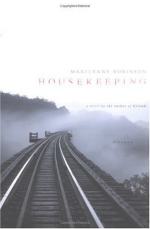|
This section contains 6,874 words (approx. 23 pages at 300 words per page) |

|
SOURCE: Aldrich, Marcia. “The Poetics of Transience: Marilynne Robinson's Housekeeping.” Essays in Literature 16, no. 1 (spring 1989): 127-40.
In the following essay, Aldrich examines the mother-daughter relationship in Housekeeping, particularly how Sylvie and Ruth evade patriarchal ideologies through language, female relationships, and unconventional actions.
Yet how could it be otherwise, since the very notion of a self, the very shape of human life stories, has always, from St. Augustine to Freud, been modeled on the man?
Barbara Johnson, “My Monster/My Self”
When we write primarily of women and not in opposition to men, according to Mary Jacobus, we are subverting convention by presenting “a difference of view”—an attempt to inscribe female difference within writing as an alternative to separatism or appropriation.1 Such subversions aptly characterize Marilynne Robinson's Housekeeping, a novel in which narrative view shifts quickly from Edmund Foster, the patriarch of the novel's central family, to the...
|
This section contains 6,874 words (approx. 23 pages at 300 words per page) |

|


